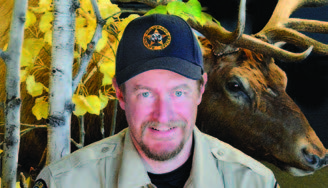Most people think black bears only live in the mountains and that being in the Black Forest area would make for a very rare sighting.†It may shock you, however, to know that black bears are sighted in the Black Forest area every year.†Recently, a trail camera I placed on private property picked up a fox feeding on a goat carcass as a bear ambled up and chased the fox away. This was north of Peyton.But donít worry that bears are taking over Black Forest. There are likely only a few bears that actually call the area home. The vast majority of the bears that are spotted or found in the area are just moving through.Why would any bears leave the mountains and settle down in Black Forest? It is important to know what makes up good black bear habitat.Four key characteristics attract bears and make them want to settle down: food, water, shelter and space. Black bears can easily find all of these resources in the Black Forest area.†Start with food. Bears are omnivorous (eat both meat and plants) and can find lots of their natural food sources like grasses, roots and berries, as well as deer and other small creatures in Black Forest.†Water naturally occurs in Black Forest, but can also be found in manmade retention ponds and stock tanks for cattle.†The Ponderosa Pine trees that give the Black Forest its name also provide great shelter for bears from the heat of the summer and visual cover to escape from the prying eyes of humans.Space is a more limiting factor for the bears in the Black Forest due to the high concentration of houses. Still, there is more space on the larger lots that are in the Black Forest than more densely populated areas surrounding the forest.So what do those that live in Black Forest need to know about bears so that everyone, including the bears, stay safe?†Bears are typically very shy of human interaction and avoid human contact whenever possible.The largest contributing factor to human conflicts with bears are food sources. Unsecured trash, accessible bird feeders (including hummingbird feeders), dirty barbeque grills, unsecured pet foods, unattended pets and unprotected livestock (including chickens, goats, bee hives etc.) are all things that bears find tasty and can be found in the Black Forest area.†We, as humans, have a responsibility to limit interactions with bears and limit their access to these attractants. At CPW, we have a saying: Garbage kills bears.†CPW recommends that everyone keep their trash in bear-proof containers or in a locked enclosure, as well as keeping their BBQís cleaned or put away, pet food stored in a locked container or enclosure, and to not put bird feeders out until the winter time when the bears are hibernating.†Livestock should be protected from all predators in an enclosure that is inaccessible to bears (such as using a hotwire around chicken coops and bee hives, locking smaller mammals up at dusk, overnight and dawn when predators are most active).If you have an encounter with a bear, remember that they are likely more afraid of you than you are of them. Back away slowly while facing the bear, talk to the bear and make yourself seem larger if possible. Bang pots or pans or use anything else that’s loud to scare away the bear, and do not run away from the bear.†Also, aside from licensed hunting, you may not shoot bears unless you are protecting human life or livestock from an imminent attack. And know that pellet or BB guns are not effective at hazing bears. There have even been incidents where bears have been accidentally killed, causing legal problems for the shooters.If you see or have an encounter with a bear, please contact the CPW Southeast Region Office at 719-227-5200 to report it. If it is an emergency, call Colorado State Patrol at 719-544-2424 and they will connect you with a Wildlife Officer.†For more information on living with bears, please visit our Bear Aware page on our website: https://cpw.state.co.us/learn/Pages/LivingwithWildlifeWildBears.aspxGot a question, problem or column idea, please email me at aaron.berscheid@state.co.us or call me at 719-227-5231.†I might even answer your question in a future installment of ìWildlife Matters.î
 |  |
| Recently, a trail camera placed on private property picked up a fox feeding on a goat carcass as a bear ambled up and chased the fox away. This was north of Peyton. Photos submitted | |




